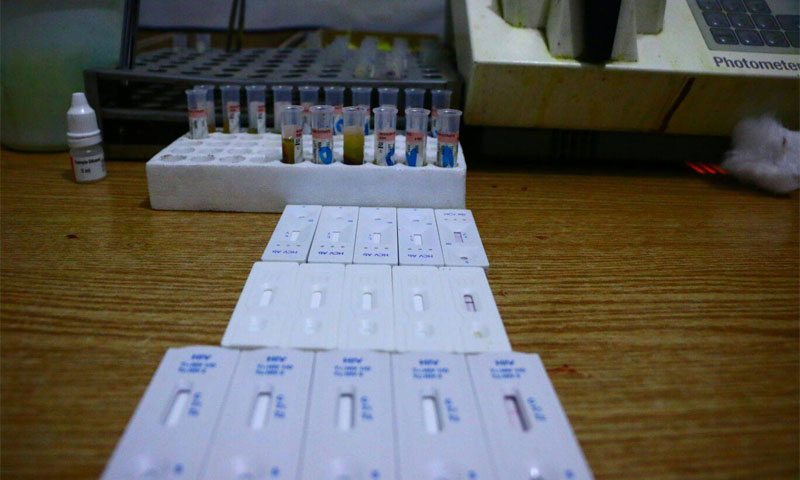The medical sector in northern Syria is suffering a severe lack of medical equipment and medicines, especially medication for chronic diseases such as insulin. Insulin is in very short supply in northern Syria, especially in Idlib and its surrounding countryside, after local and international medical organizations stopped providing it.
Diabetes patients face many difficulties obtaining the drug after it became scarce and actors who used to provide it from pharmacies and medical points in Idlib and its countryside stopped providing it. Nabil al-Saeed, a pharmacist in the town of Kafr Takharim in Idlib’s countryside, said that organizations – the most prominent being the Syrian American Medical Organization (SAMS) – used to provide the drug, but stopped doing so around four months ago.
A shipment of insulin held in Turkey
Before the opposition factions took control of the city of Idlib and its countryside in 2015, the Directorate for Health under the authority of the Syrian regime provided insulin to diabetes patients. According to al-Saeed, the Directorate stopped distributing the medication to clinics in the area. Al-Saeed added that the Directorate for Health under the Interim Government put forward a proposal some months ago to provide a quantity of insulin to last an entire year.
The pharmacist estimated that the quantity needed by patients in northern Syria is around 20,000 doses, clarifying that “the Directorate proposed a project to support organizations but did not find any response. They only gave vague promises, which patients are paying for with their time.”
Enab Baladi spoke to Doctor Tamer Mala Hasan, the operations manager of the SAMS organization office in Turkey, who confirmed the lack of insulin in these areas. He indicated that there is a large shipment stalled in the port for the past six months “due to objections to its entry by the Turkish government”.
The shipment contains 18,000 doses, which would meet the needs of diabetes patients in northern Syria for over six months, according to Mala Hasan. He indicated that the organization is in the process of completing an emergency purchase of around 2500 doses to cover the shortage until the shipment enters in the near future.
Mala Hasan sees that while persons with a supply of insulin will not be affected, others will be greatly affected. He explained that the four centers run by SAMS in Idlib and its countryside have completely stopped giving insulin to those under the age of 25. He explained, “In the past four months, we sent them one shipment while patients’ consumption is very high. The organization alone has over 1000 registered patients who need a constant supply or a large shipment.”
High price of insulin
An employee in the Directorate for Health in Idlib, who refused to disclose his name, said to Enab Baladi that only 1000 doses of insulin have entered the Directorate’s warehouse in the past four months. He confirmed that the amount is not enough to meet the needs of patients in critical condition, “which adds to their suffering considering they have to pay exorbitant prices for it due to its scarcity.”
The employee attributed the scarcity of insulin to pharmacists and private medical centers in the area not buying insulin due to its high price and the continuous electricity cuts, “No one can afford to buy it and the drug can be destroyed in the event it is not preserved well.”
Ahmad Abbad (50 years old) who suffers from diabetes, has seen his health situation deteriorate, forcing him to obtain insulin through traders who bring it in from regime-controlled areas while others bring it in from Turkey. Speaking to Enab Baladi, he confirmed that he cannot always pay for it because of its high price, “Insulin coming from the regime areas is sold for double its price.”
Abbad expressed his frustration with medical organizations and said that they do not care about people with chronic illnesses, pointing to the complete absence of any care centers or rehabilitation centers for diabetes patients in Idlib and its surrounding countryside.
A solution to the problem of the scarcity of insulin remains unclear at the time of writing of this report. While the organizations concerned try to counter the shortage to prevent incidents among diabetes patients who need medical care and constant monitoring, those in charge continue to highlight the many obstacles standing in their way.










